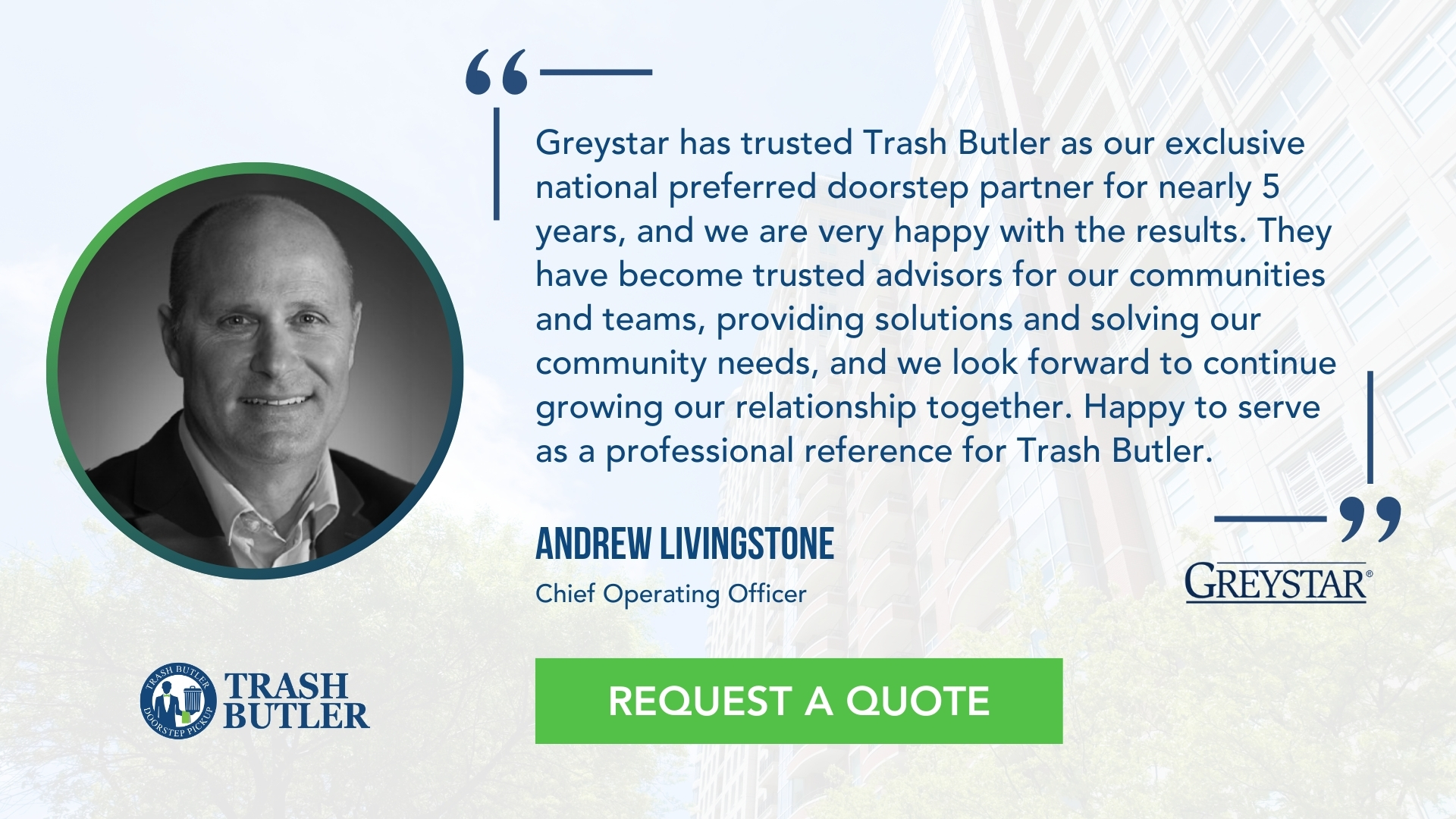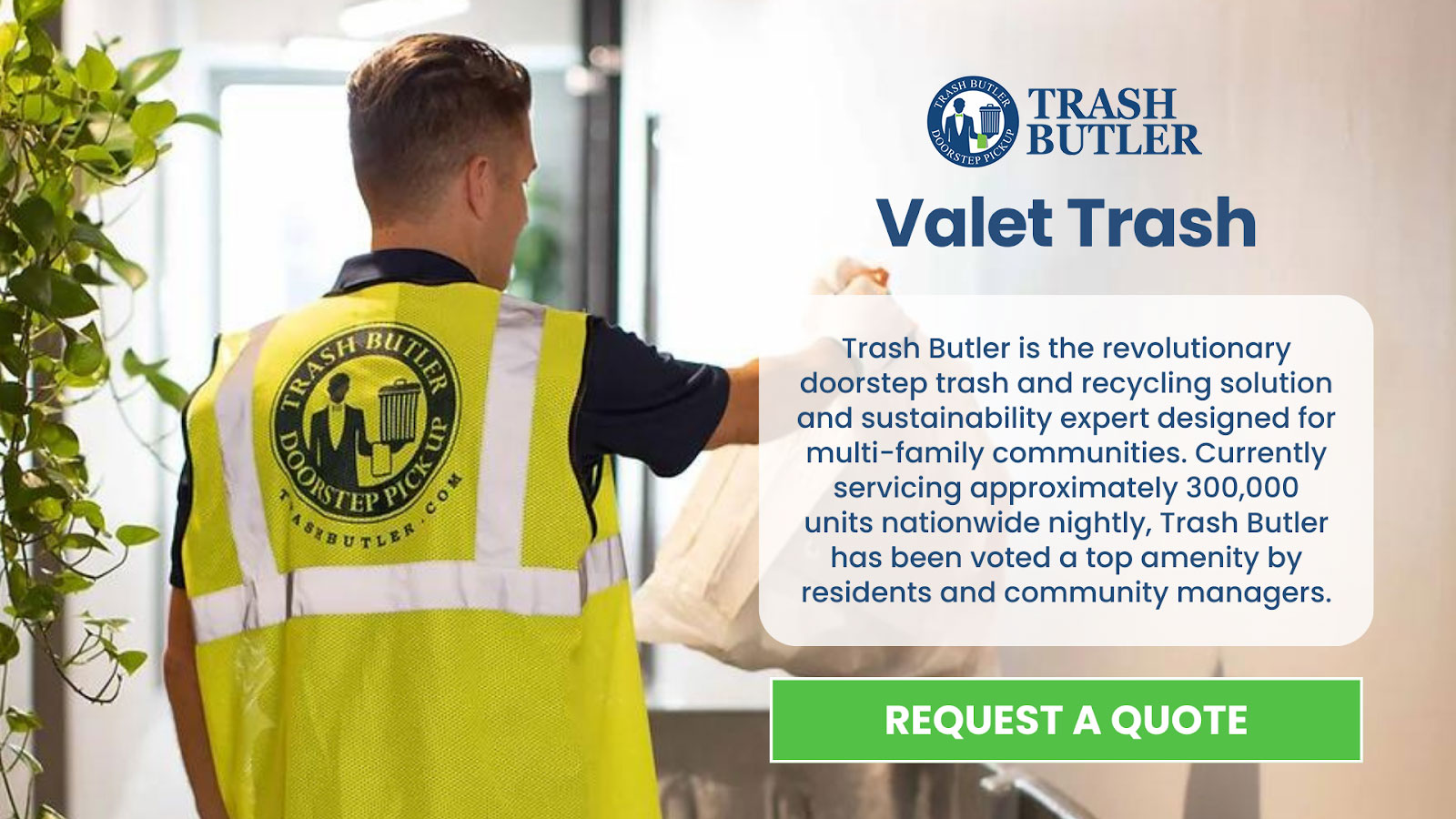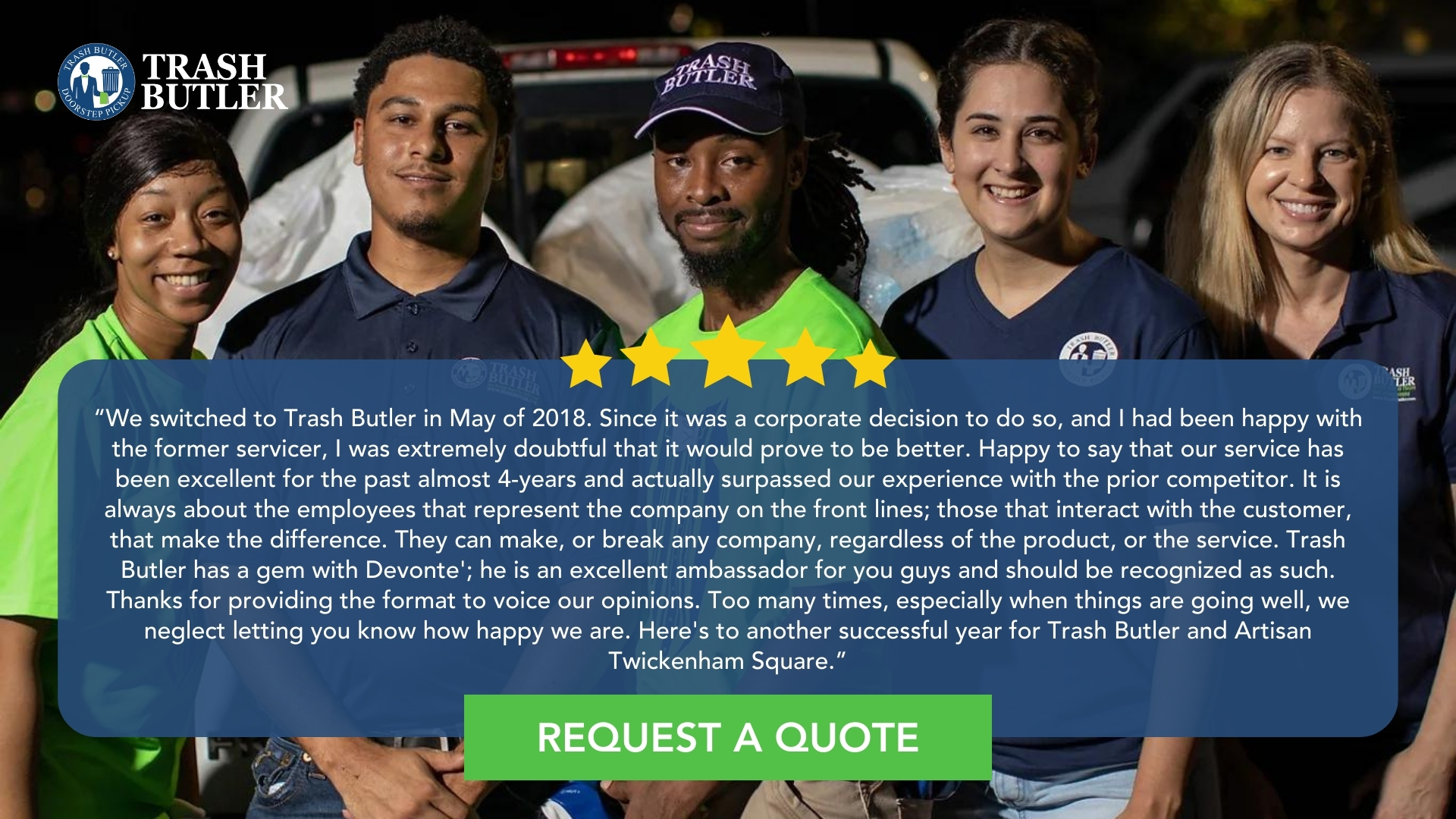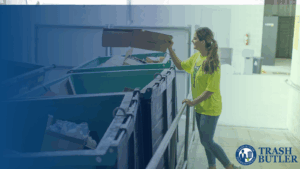Key Takeaways:
- Clean, Easy, Efficient: Valet trash services (like Trash Butler) are key to streamlining large apartment complex waste management, boosting convenience and cleanliness.
- Resident Habits Make or Break Success: Resident behavior significantly impacts waste management success, emphasizing the need for clear communication and engagement.
- Modern Waste Solutions Drive Value: Modern residents expect convenient, sustainable, and tech-driven waste solutions, driving property value and satisfaction.
Managing waste in large apartment complexes isn’t just about keeping trash out of sight—it’s about creating a clean, efficient, and well-organized environment for hundreds of residents. As communities grow in size and density, so do the challenges of consistent garbage disposal, overflowing dumpsters, and resident complaints.
Property managers are under increasing pressure to maintain cleanliness, meet sustainability goals, and reduce operational headaches, all while improving resident satisfaction. That’s where a more innovative, more streamlined approach comes in.
With the right systems, waste management can shift from a constant burden to a value-adding amenity. In this post, we’ll explore practical strategies and solutions, including how Trash Butler’s valet trash service can simplify the collection, boost efficiency, and help your large apartment community operate cleaner, greener, and more effectively daily.
What Are The Common Waste Challenges In Large Apartment Complexes?
Managing waste efficiently in large apartment complexes presents unique operational and environmental hurdles. Understanding these challenges is the first step toward implementing effective solutions.
Inefficient Collection Processes
With hundreds of residents producing waste daily, traditional dumpster-based collection often leads to overflow, unsightly messes, and logistical headaches for property teams. Peak disposal times can overwhelm capacity, contributing to sanitation issues and resident frustrations.
Contamination Of Recyclables
Despite well-intentioned recycling programs, improper sorting and lack of resident education can cause contamination. Non-recyclable items mixed into recycling bins decrease the effectiveness of recycling efforts, resulting in higher costs and more waste heading to landfills.
High Operational Costs
Maintaining adequate waste infrastructure in sprawling properties, such as frequent pickups, extra staffing, and equipment maintenance, can strain budgets. Unexpected repairs and overflow mitigation further drive up expenses.
Compliance And Regulatory Pressure
Local regulations on waste diversion, recycling, and bulk disposal are increasingly strict. Non-compliance may lead to fines, legal risks, and damage to a property’s reputation within the community.
Resident Engagement And Convenience
Encouraging consistent resident participation in proper waste disposal and recycling is an ongoing challenge. A lack of convenient options often leads to improper disposal practices, undermining community sustainability goals.
Why Is Large Apartment Complex Waste Management So Complex?
Effectively managing waste in large apartment complexes comes with unique challenges beyond transporting trash from point A to point B. The sheer scale, diverse resident needs, and compliance demands make successful waste management a logistical puzzle for property managers.
Volume And Frequency Of Waste
Large apartment complexes generate substantial volumes of waste and recyclables daily. The intensity and frequency of pickups required to keep up with resident demand often stretch the capabilities of traditional waste collection systems.
Diverse Resident Behaviors
Each resident has individual disposal habits and varying levels of recycling knowledge. Coordinating a community of hundreds or even thousands means managing inconsistencies in sorting and schedules, which can result in contamination or overflowing bins.
Layout And Accessibility Challenges
Complex building layouts and multiple entry points complicate the logistics of collection. Long hallways, high-rise floors, and limited access points make efficient waste removal difficult without specialized plans and resources.
Regulatory Compliance
Waste management in multi-family housing must adhere to strict local and federal regulations, including mandates for recycling and hazardous waste disposal. Keeping up with changing rules and ensuring residents do, too, requires constant vigilance and effective communication.
Amenity Expectations
Modern residents expect clean, convenient, and hassle-free waste disposal options. Meeting these standards consistently while juggling operational challenges adds another layer of complexity for property managers.
How Can Valet Trash Services Improve Apartment Garbage Disposal?
Valet trash services are rapidly becoming a staple amenity in large apartment complex waste management strategies. These solutions transform waste collection, processing, and removal, offering clear advantages for residents and property stakeholders.
Increased Resident Convenience
One of the most significant benefits valet trash services offer is unmatched convenience for residents. With door-to-door pickups, tenants can simply leave their waste outside at scheduled times, eliminating the need to carry garbage through long hallways or down multiple flights of stairs. This effortless process encourages consistent waste disposal and fosters a cleaner living environment.
Enhanced Property Cleanliness
Valet trash services also help maintain building cleanliness by reducing overflowing dumpsters, loose trash in hallways, and unauthorized dumping. Regular and professional pickups prevent waste from piling up in common areas, directly supporting property aesthetics and hygiene. This benefits the daily resident experience and upholds the property’s image during tours and inspections.
Streamlined Operations For Property Managers
For property management teams, valet trash programs simplify waste collection logistics. Instead of coordinating with multiple vendors or dealing with irregular disposal habits, managers have predictable schedules and centralized reporting. This operational efficiency helps reduce labor costs, minimize waste-related maintenance issues, and ultimately increase the value proposition offered to residents.
What Role Does Resident Behavior Play In Waste Management Success?
When it comes to extensive apartment complex waste management, the habits and engagement of residents significantly influence overall efficiency and environmental impact. Resident participation determines how well waste is sorted, contained, and ultimately handled by property management.
Consistency In Waste Disposal
Consistent participation from residents adhering to established guidelines for waste and recycling helps maintain cleanliness and prevent overflow. Missed collection days or improper bagging can create logistical challenges and safety hazards, underscoring the importance of reliable resident routines.
Proper Sorting And Contamination Prevention
The accuracy with which residents sort their trash and recyclables directly affects the quality of recyclables collected. Mixing food waste with recyclables or incorrectly disposing of hazardous materials not only increases processing costs but can also negate sustainability efforts.
Engagement With Communication And Policy
Residents who stay informed about waste management policies and participate in community education initiatives are more likely to comply with disposal standards. Clear communication channels between management and residents can minimize confusion and drive compliance, supporting smoother operations throughout the complex.

What Waste Management Features Do Residents Now Expect In Apartments?
As urban living evolves, so do residents’ expectations regarding how their waste is handled. Large apartment complexes, in particular, must keep pace with these expectations to maintain resident satisfaction and a competitive edge. Here’s what modern renters now consider essential:
Convenient Doorstep Collection
Today’s residents prioritize convenience above all. Scheduled doorstep collection services for trash and recycling eliminate the need for late-night trips to distant dumpsters, fostering ease and encouraging participation in proper waste disposal habits.
Robust Recycling Programs
With increasing environmental awareness, effective recycling programs are no longer a bonus but a necessity. Residents expect clearly labeled bins, easy-to-understand sorting guides, and regular pick-up schedules that ensure recyclables are processed and not sent to landfills.
Sustainability-Focused Initiatives
Renters want to see genuine sustainability efforts, such as composting options, partnerships with local recycling centers, or education about reducing waste. These initiatives not only lower the community’s ecological footprint but also align with the values of environmentally conscious tenants.
Smart Collection & Notification Technologies
Integrating technology into waste management can simplify the resident experience. Features like mobile app notifications for pick-up times, real-time overflow alerts, and digital reporting on community waste stats are increasingly expected as part of a modern apartment lifestyle.
How Can Property Managers Reduce Complaints About Trash Overflow?
Property managers in large apartment complexes face persistent challenges with trash overflow, which can quickly lead to dissatisfied residents and negative reviews. Addressing these concerns requires strategic planning and active engagement with residents and on-site staff.
Optimize Collection Schedules
Evaluate peak times for trash accumulation and adjust collection schedules accordingly. Increasing frequency during weekends or move-in periods can help prevent bins from overflowing, ensuring receptacles are available when residents need them most.
Educate And Engage Residents
Clear communication about proper waste disposal protocols can significantly reduce misuse. Distribute information through welcome packets, signage, and resident portals to reinforce guidelines on what, when, and how to dispose of waste efficiently.
Monitor Common Areas Regularly
Conduct routine inspections of shared trash rooms and exterior collection points. Early detection of problems, such as blocked chutes or incorrectly bagged items, allows for timely intervention before issues escalate.
Implement Recycling Solutions
Designate separate, clearly labeled bins for recyclables to minimize cross-contamination and overflow in general trash containers. Encouraging recycling reduces waste volume and aligns with sustainability initiatives sought by many residents.
What Are The Best Practices For Scheduling Apartment Complex Trash Pickup?
Efficient scheduling is the backbone of large apartment waste management. A strategic approach not only ensures cleanliness and resident satisfaction but also minimizes disruption and controls costs. Establishing and optimizing a waste collection schedule involves several best practices.
Analyze Resident Habits And Peak Waste Times
Start by gathering data on resident routines and peak disposal periods. This might involve surveying tenants and monitoring disposal volumes throughout the week. Adjust pickup schedules to match these high-volume times, reducing overflow and keeping common areas clean.
Coordinate With Local Regulations And Holidays
Stay aware of local ordinances and municipality collection calendars. Some areas restrict pickup on specific days or have mandated recycling schedules. Incorporate civic holidays and city-wide changes into your plan to avoid missed collections and service interruptions.
Communicate Clearly And Proactively
Proactive communication with residents ensures everyone is on the same page. Display updated collection times in common areas and send reminders before schedule shifts or special waste events. Clear queues help minimize missed pickups and keep waste areas orderly.
Prioritize Safety And Accessibility
Schedule pickups during low-traffic hours to minimize interference with residents and staff. Ensure all collection points are accessible and well-lit, particularly for early morning or evening pickups. This approach reduces risk and streamlines the process for waste removal teams.
Final Thoughts
Efficient waste management in large apartment complexes is no longer a luxury; it’s necessary to maintain resident satisfaction, meet regulatory standards, and achieve sustainability goals. Every aspect of a property’s waste strategy impacts its reputation and operational success, from addressing overflowing dumpsters to encouraging resident engagement.
By integrating modern solutions like valet trash services, property managers can transform trash collection from a pain point into a premium amenity. The future of multifamily living is clean, green, and conveniently managed, and with the right strategies, your community can lead the way.
Request a Quote: Fill out a form to see how Trash Butler™ can benefit your community.
Read also:
- How Valet Trash Reduces Waste Overflow And Dumpster Issues In Apartments
- Why Multifamily Properties With Valet Trash See Fewer Pest Problems
- The Growing Demand For Pet-Friendly Amenities In Apartment Complexes
Frequently Asked Questions About How To Streamline Waste Management Across Large Apartment Complexes
How can large apartment complexes improve waste sorting?
Improving waste sorting begins with targeted resident education, clear signage, and the use of color-coded bins for trash, recycling, and compost. Partnering with experienced providers like Trash Butler can help reinforce best practices through ongoing training and regular communication, supporting your community’s sustainability goals.
What are the benefits of streamlining waste management?
Streamlining waste management reduces operational costs, minimizes environmental impact, and creates a cleaner, more attractive living environment for residents. For property managers, efficient waste management can also result in fewer violations and enhanced property value, making your complex more competitive in a crowded market.
What are some cost-effective waste management strategies for apartments?
Cost-effective strategies include implementing valet trash services to consolidate pickups, optimizing collection schedules based on data, and providing resources that encourage residents to reduce and properly separate their waste. Bulk purchasing of supplies and innovative use of technology can also keep expenses low while maximizing efficiency.
How can resident participation in waste management be increased?
Resident participation can be increased through ongoing engagement, such as regular reminders, informative workshops, and incentive programs. Making sorting and recycling more convenient—like offering doorstep pick-up with Trash Butler—also drives higher compliance. Transparent communication about the environmental and community benefits further motivates residents to participate.
How can composting be implemented in a multi-family complex?
Successful composting in multi-family settings requires easy-to-use collection bins, educational materials about what can and cannot be composted, and frequent pick-ups to prevent odor or pest issues. Collaborating with waste management experts ensures the process fits seamlessly into your existing workflow without disruption.
How can recycling programs be tailored for large apartment complexes?
Effective recycling programs are tailored by assessing the specific needs of your resident base, offering individualized guidance, and selecting the right containers for limited spaces. Custom signage in multiple languages and resident feedback loops help maximize recycling rates. Partnering with a provider like Trash Butler ensures continuous support and program optimization.
What types of waste collection systems are suitable for apartments?
The most suitable systems for apartments are those that prioritize resident convenience and minimize on-site labor. These may include doorstep valet trash and recycling services, centralized collection points, and chute-based systems with clear sorting instructions. It’s essential to select scalable and adaptable systems to changing sustainability requirements.







